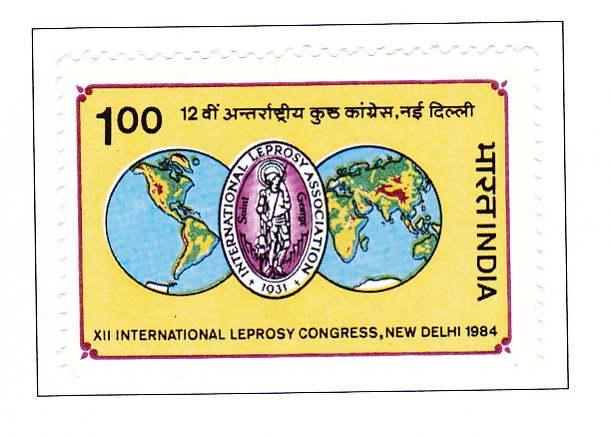12th International Leprosy Congress, New Delhi

Technical Data
| Date of Issue | February 20, 1984 |
|---|---|
| Denomination | Rs. 1 |
| Quantity | 1,500,000 |
| Perforation | comb 13 |
| Printer | Security Printing Press, Nashik |
| Watermark | No Watermark |
| Colors | Multicolor |
| Catalog Codes |
Michel IN 984 Stamp Number IN 1051 Yvert et Tellier IN 799 Stanley Gibbons IN 1118 |
| Themes | Conferences | Healthcare | Logos |
The XII International Leprosy Congress, held in New Delhi from February 20 to 25, 1984, was a significant event in the field of leprosy research and treatment. The congress was organized by the International Leprosy Association (ILA), an association of leprologists worldwide, in collaboration with the Hind Kusht Nivaran Sangh (Indian Leprosy Association) and the Government of India. This congress marked the first time that many young leprologists from India and around the world participated in such a large-scale international event, with over 1,200 delegates from 120 countries in attendance.
Activities of the International Leprosy Association (ILA):
- Publication of International Journal of Leprosy: The ILA publishes a quarterly journal that disseminates the latest research and developments in leprosy.
- Advisory Role: The ILA provides suggestions and guidance to various governments on their leprosy control programs, helping shape effective public health strategies.
- Collaboration with WHO: The ILA advises the World Health Organization (WHO) and allied health agencies on leprosy control programs, ensuring coordinated international efforts.
- Organizing International Leprosy Congress: The ILA is responsible for holding the International Leprosy Congress every five years, fostering global collaboration and knowledge sharing.
XII Congress Highlights:
- Training and Education: A special feature of this congress was the introduction of teaching and training sessions through slide, tape, and video presentations. These sessions aimed to educate young leprologists on all aspects of leprosy.
- Eminent Participants: Most of the world’s eminent leprologists attended the congress, making it a significant event for sharing knowledge and advancements in leprosy research and treatment.
Historical Background:
- Armauer Hansen: Leprosy, also known as Hansen’s Disease, was named after the Norwegian physician Armauer Hansen, who identified the leprosy bacilli in the 19th century. His discovery was crucial in understanding the causation of the disease.
Commemoration:
To mark the significance of this event, the Indian Posts & Telegraphs Department issued a special stamp. This stamp not only commemorates the congress but also highlights the ongoing efforts in the global fight against leprosy.
The XII International Leprosy Congress in New Delhi was a landmark event that advanced the global understanding and control of leprosy, bringing together experts and young researchers from around the world to collaborate and share their knowledge.
